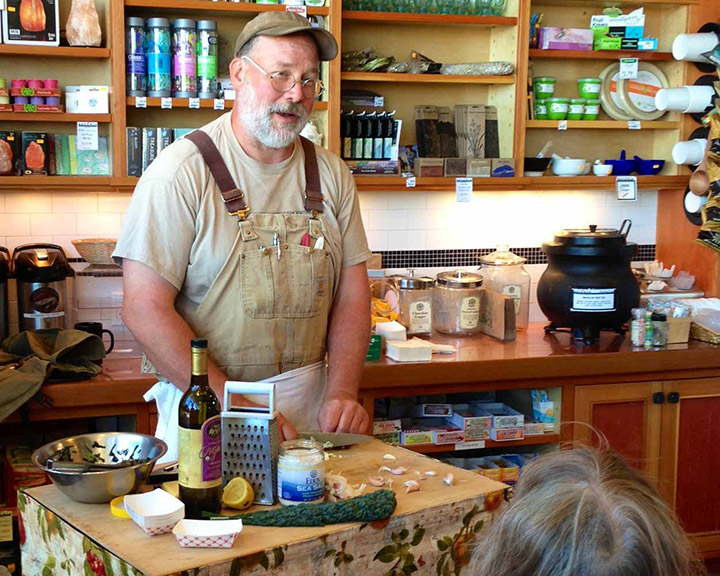Creating a local food resource in Pacific County
Located in the beautiful Naselle River Valley, Fred’s Homegrown Produce gives Pacific County restaurants and residents a chance to enjoy the benefits of fresh, local produce. The farm is also home to a salmon habitat restoration project that spans nearly 20 acres.
Fred Johnson’s interest in farm-fresh meals began with the Meadowcreek Project, a sustainable, self-sufficient community tucked into the Ozarks. There, he was challenged to create menus with the produce grown on-site. The quality and variety of fresh produce left an impression.
Years later, after moving to the West Coast, he opened a restaurant on Vashon Island and sought to source local, fresh food whenever possible. But consistently sourcing farm fresh ingredients proved to be difficult.
Then, he found 70 acres in Naselle, which had previously been a dairy farm. The farm was built by John Hill, a Finnish pioneer, in 1898 and was badly neglected. After selling the restaurant and purchasing the historic homestead, Fred brought the farm back to life with a new purpose: to make a local platform for farming that will outlive him and serve the community.
Here are Fred’s reflections on doing business in Pacific County.
Why did you choose to start a business in Pacific County?
I never had the farmer-supplier availability to support a full-time restaurant with fresh food at an affordable price. When I found a dairy farm on the Naselle River that I could afford, I sold my restaurant, got the farm, and endeavoured to supply restaurants.
Where did the idea for your business come from?
Having a restaurant and not being able to have local food infrastructure to do business with. I wanted to try growing into the next stage—localized food production, processing, and distribution.
At this point, now that I figured it out, I’m asking: what do I want to do with it?
We have an urgent need to create an alternative to the food system we have now. We need some way to evolve, so I’m trying to build a 10 year plan to create a food hub in Naselle, in Pacific County. I want to be part of creating a local food resource that outlives me so that when I die, it still performs. The community can take it over.
How do you define success?
For me, it’s about connecting people with where their food comes from and making money. My farm is a resource for food available on a local level.
The idea of being at a table with a meal that’s 80% sourced from the community and knowing this is the grass that the cow fed on, this is the beef—it just makes that connection with people. When you feed somebody good, healthy clean food, they react to it positively. It makes for a good party. A real good party.
What has been your most satisfying moment in business?
The most exciting thing is figuring out how to be successful as a farmer and how to coordinate local foods. When I came into it, I didn’t know how it could be done. I wasn’t a farmer; I was a chef. It was a different lifestyle for sure. I didn’t know it could be done, and now I know it can be done.
What is unique about your business?
I’m creating a new model for food production or, really, rediscovering and making new.
The first farmers in Naselle came in the late 1800s, and they were in the logging business. There was logging and fishing. They didn’t have a food infrastructure at that time, and they had to have farmers. There was a really good business in dairy. They shipped it every day from the boat launch in Naselle.
If you had one piece of advice to offer someone starting a business in Pacific County, what would it be?
Have sufficient capital. Make sure you have a great business plan and be willing to work with the existing community.
Have some skill sets to be able to access and work within the existing community as opposed to just coming in and being a competitor to existing business. I benefited by just talking to people and letting them know I’m here to work with them, not against them.
Final Thoughts
For any aspiring business owner in Pacific County, here are a few key takeaways from Fred’s experience:
- You don’t have to know everything about an industry to get started. Persistence and a willingness to learn new skills pays off.
- Find a community need and cultivate a business around that need.
- Raise sufficient capital early on.
- Develop a great business plan and have a clear vision for what you want to create.

